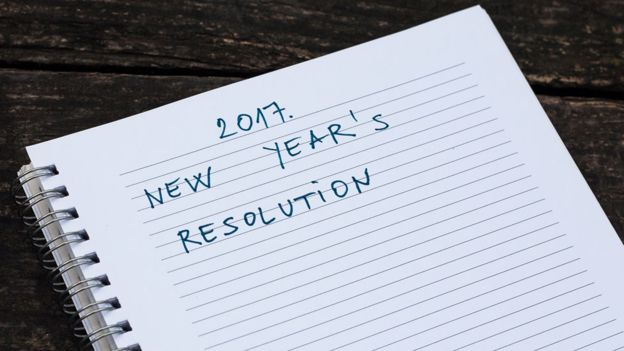
In these first days of the new year, millions of us will have embarked on a resolution for 2017.
And maybe a good percentage will already have given up and decided that maybe the following year will be the time to finally write that bestselling novel.
But why do we keep putting things off? Why is procrastination such a common problem?
It’s claimed as a particular difficulty for students and academics.
Professor Tim Pychyl, a psychologist at Carleton University in Canada, is part of the Procrastination Research Group and calls it “the biggest problem in education today”.
Putting it off
A lecture in which he gives advice to students on how to stop procrastinating recently passed 170,000 views on YouTube.
Procrastination, it’s claimed, can affect student grades, drop-out rates and mental and physical health.
 Image copyrightISTOCK
Image copyrightISTOCKLecturers suffer from procrastination too, with academic Twitter feeds talking about “writing guilt” and the battle between marking papers and watching Netflix.
With more people studying online, procrastination is a greater problem than ever before.
At only the click of a button, an essay can be replaced by a video of a sneezing kitten, or a Facebook photo album of your ex and her new boyfriend on holiday.
Prof Pychyl says procrastination is making the choice to avoid doing something, even though we know this will cost us in the long run.
He says it is different from intentionally delaying doing something, and it is not a problem of time management, but a failure to control our emotions.
“When we procrastinate, we are trying to improve our mood by avoiding doing something that feels unpleasant to us,” he says.
“A bit like getting drunk or comfort eating, it is a coping strategy to feel better by distracting ourselves with short-term pleasure and forgetting about a problem.”
What can you do about it?
Procrastination is more common among people who are impulsive, prone to perfectionism, burdened by other people’s expectations of them, and scared of failure.
It affects younger people in particular, because we get better at controlling our emotions as our brain develops.
But there is hope for procrastinators.
Based on his research with Dr Fuchsia Sirois of the University of Sheffield, Prof Pychyl insists that anyone can reduce procrastination with the following steps:
1) Practice techniques of mindfulness and meditation to gain control over negative thoughts.
“Using mindfulness techniques, we can acknowledge that we do not feel like doing something without making a judgement on this feeling, then remind ourselves why the task is important, and commit to making a start,” says Prof Pychyl.
 Image copyrightISTOCK
Image copyrightISTOCK“And when we make progress on a task, we feel better about ourselves and this makes it much easier to carry on.”
Sir Anthony Seldon, vice chancellor of the University of Buckingham, has introduced mindfulness sessions for staff and students.
2) Break down a task into clear and manageable steps.
One reason for procrastination is that the targets we set are often too big and vague, which makes them seem more intimidating and unpleasant.
So you should scale down your new year’s resolutions from “get in shape” or “write a novel” to “put on your running gear” or “find a name for your main character”.
At the University of Warwick’s Warwick Manufacturing Group, Paul Roberts runs mind-mapping workshops for students.
This technique helps them to break down large tasks so that they can see what steps they will need to take to complete their projects.
He says this helps them to overcome the inertia of starting, and procrastination drops as a result.
3) Don’t punish yourself for procrastinating.
Prof Pychyl’s research shows that students who forgive themselves for procrastinating are less likely to delay in the same way on their next assignment.
So the more guilt and anger you feel about depriving the world of your groundbreaking novel this year, the less chance you have of writing it next year.

4) Build on the good habits you already have.
Prof Pychyl says he finally managed to obey his dentist’s instruction to floss by combining it with his existing habit of brushing his teeth.
He committed himself to placing the floss on the counter in front of him every time he brushed his teeth, and flossing soon became second nature to him.
5) Get in touch with your “future self”.
When people were shown a digitally-aged picture of themselves and then asked to allocate money, they were more likely to save for retirement because they felt a stronger association with their future selves.
Putting a digitally-aged self-portrait by your desk might prompt your colleagues to look at you strangely or even accuse you of time travel.
But if your deadline is 9am, then simply imagining yourself desperately writing the essay at 2am might persuade you to start earlier.
6) Work out why you care about what you are doing.
Prof Pychyl says procrastination can often reflect a deeper existential problem of lacking an identity or a direction in life.
We procrastinate on tasks that we see as boring or less meaningful. So remind yourself why you are doing something and how it fits in with your ambitions.
Perhaps writing a good essay will help you get a good degree, which will help you pursue your dream of being a doctor.
By thinking in this way, the long-term benefit of doing your work can overpower the short-term pleasure of distractions.
Anti-procrastination lessons
If these research-backed steps are so effective, should they be taught in every school, university and workplace?
Many universities, such as UEA, Goldsmiths and Bradford, produce guides on procrastination for students.
But Prof Pychyl says much advice still focuses on time management skills, rather than tackling the root causes.
“Professors should address how students are feeling throughout the term and help them to understand why they procrastinate,” he says.
“If they can learn to manage their emotions, it will help them in every area of their lives.”
Source: BBC
THE ROTTEN FISH: CAN OF WORMS OPENED OF APC & TINUBU'S GOVERNMENT OVER NIGERIA'S ECONOMIC DOWNTURN
WATCH THE CRITICAL ANALYSIS AND KNOW THE RESPONSIBLE PARTIES TO BLAME FOR NIGERIA'S ECONOMIC CHALLENGES, WHILE CITIZENS ENDURE SEVERE HARDSHIPS.Watch this episode of ISSUES IN THE NEWS on 9News Nigeria featuring Peter Obi's Special Adviser, Dr Katch Ononuju, 9News Nigeria Publisher, Obinna Ejianya and Tinubu Support Group Leader, McHezekiah Eherechi
The economic crisis and hardship in Nigeria are parts of the discussion.
Watch, leave your comments, and share to create more awareness on this issue.
#9NewsNigeria #Nigeria #issuesInTheNews #politics #tinubu THE ROTTEN FISH: CAN OF WORMS OPENED ...
DON'T FORGET TO SUBSCRIBE AND LEAVE YOUR COMMENTS FOR SUBSEQUENT UPDATES
#9newsnigeria #economia #economy #nigeria #government @9newsng
www.9newsng.com
